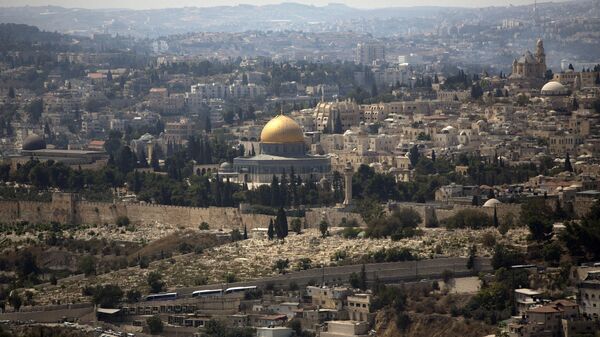Jerusalem is still leading in terms of the number of people infected by COVID-19 in Israel, official data shows. Out of the city's nearly one million inhabitants, at least 1,464 residents have been diagnosed with the virus and the numbers are only expected to grow, the Health Ministry warns.
The streets, usually packed with people, are now deserted, especially following new governmental regulations that kicked off on Tuesday night imposing a total lockdown on the country, with Israelis banned from leaving their homes or moving from one city to another.
Tourists are also hard to find. Jerusalem, sacred to three religions and boasting a variety of attractions and tours, was dubbed one of the world's top destinations in 2018, attracting nearly five million tourists.
Similar numbers were registered in 2019 too and authorities had hoped that the amount of tourists would only grow. But the outbreak of the pandemic that has shattered tourism worldwide has brought this growth to a standstill.
Tourism Industry Devastated
Ilanit Melchior, the head of tourism at the Jerusalem Development Authority, says the city's authorities are struggling to estimate the damage "because the numbers are still rolling" but stresses that the damage can be seen with the naked eye.
"Tour guides are now unemployed. All the restaurants in the city are closed. Same holds true for markets, entertainment events and shows. Major sporting events and competitions have been cancelled too. [The virus] dealt a severe blow to West and East Jerusalem's economy which have been relying on tourism".
In 2018 alone, the industry brought in over $360 million into the economy, supported over 2,000 businesses, and created an estimated 20,000 jobs, official data shows.
Now the disputed city will need to become accustomed to a new reality, but Melchior says authorities have the experience to handle such complex situations.
During the Second Popular Uprising in the early 2000s that saw a surge in Palestinian terrorist activity and that claimed the lives of more than 900 people, Israel recorded a low numbers of tourists.
In 2001, for example, Israel only 1.2 million tourists visited the country, a drop of nine percent from the previous year.
"Despite the fact that the city suffered from a bad image caused by the unstable security situation and terror, every time we approached the government, we managed to get out extra support and came up with meaningful and useful international campaigns", Melchior explained.
Not Losing Hope
This time around they have a plan too. Last Wednesday, Melchior and her team launched a project called Jerusalem is Travelling to U aimed at showing the city virtually.
The idea is that people from all over the world will now be able to light a candle in the Church of the Holy Sepulchre, put a note in the city's Western Wall or tour the various museums - all from the comfort of their homes.
Although it won't generate any money for the authorities, Melchior believes it will still do the trick. "It will keep Jerusalem in the back of the mind of travellers. So when this mess is behind us, people will remember Jerusalem and come here".
Apart from encouraging foreign tourists specifically from such countries as Germany and Russia, where COVID-19 has been relatively mild, Jerusalem is also planning to boost the amount of domestic travellers by offering them attractive packages at affordable prices. "Once the borders are opened, Israelis will be the first to board on a plane and travel abroad. We realise that and are working on giving them an alternative", explained Melchior adding that the municipality invests millions in cultural and sport events.
Clouds on the Horizon?
Yet, for city hall to continue to do so, they will need a functioning government and generous cash injections, both of which are a commodity in Israel.
After three election campaigns that have cost Israelis some $2.5 billion, the country still doesn't have a government. Although a light at the end of the tunnel is showing, with Prime Minister Benjamin Netanyahu and his former rival turned ally Benny Gantz making progress in coalition talks, the tourism industry is still lacking the funds it needs to tackle the current crisis.
At the end of March, Netanyahu approved a budget of more than $22 billion aimed at keeping Israel's economy afloat in light of the raging virus. But compared to other countries that have injected hundreds of billions and sometimes trillions, the PM's efforts seem to be a drop in the ocean.
However, Melchior is still optimistic that the Israeli government will make things work. "We will probably start going back to normal after the Passover holidays. But the first foreign tourists will come to Israel only in October-November, and I believe the graph will go up in 2021 simply because after spending three or four months on Zoom, people will miss human beings and the world will be thirsty for tourism".



